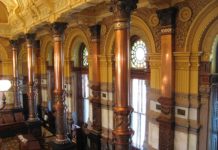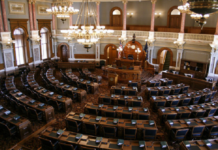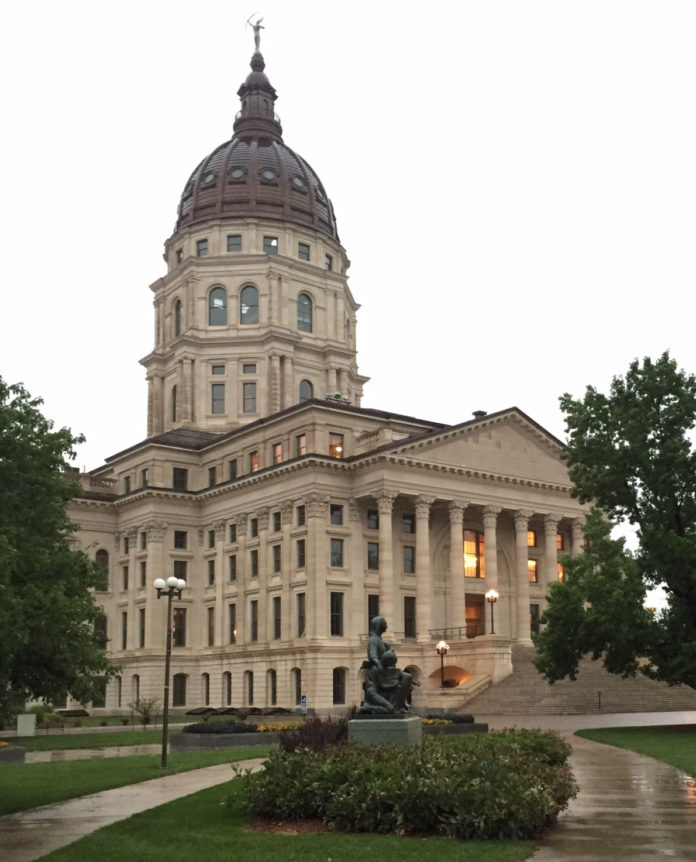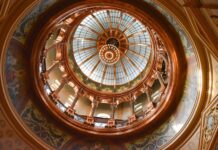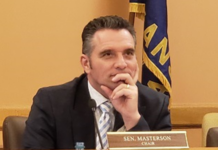At a time of heightened political tension, a group of House Democrats is backing legislation that would ban concealed handguns at the Kansas Capitol.
Led by Democratic state Rep. Boog Highberger of Lawrence, a coalition of 10 lawmakers is sponsoring legislation that would reverse a law enacted in 2014 that was intended to allow holders of concealed-carry permits to take their guns into more public buildings.
The bill, which does not apply to law enforcement, comes weeks after supporters of President Donald Trump rioted at the Capitol and there were threats of potential violence at statehouses across the country, including Kansas.
And last week, the Labor Department — a focus of heavy criticism because of unemployment fraud and unpaid claims — revealed it was the target of threats, as well.
“It’s something I have had concerns about ever since I started in the Legislature,” said Highberger, a lawmaker since 2015.
“Given the recent events in Washington, I think that makes it timely to look at it,” he said. “I think the events in Washington were a wake-up call.”
Seven years ago, in June 2014, the Legislative Coordinating Council — made up of the Legislature’s top leaders — was given the opportunity under the law to decide whether to allow concealed-carry in the Capitol.
The LCC met that month and didn’t take action, clearing the way for concealed handguns to be carried in the Capitol.
A year later, the law was broadened to allow the carrying of concealed handguns in the Capitol regardless of whether someone had a permit.
“I was shocked,” Highberger recalled about learning that guns were allowed in the Capitol when he first arrived in the Legislature.
“I can’t see any reason why a representative of the people should need to bring a loaded gun into the people’s house,” he said.
The bill could likely face opposition from a more conservative Legislature that has consistently passed laws expanding gun rights in Kansas.
It’s not known whether the bill would even get a hearing, but the proposal could surface as an amendment to gun bills now pending in the Legislature.
“Citizens, legislators and staff have been able to carry concealed firearms in and around the Capitol for self defense for years,” National Rifle Association lobbyist Travis Couture-Lovelady said in a text message.
“There is no reason to change that now except an irrational fear of firearms,” he wrote.
“We had many discussions when I was a member of the House how it would end very quickly should anyone come into the room and intend to do harm based on the number of legislators carrying and fully prepared to defend themselves and their colleagues.”
Currently, 23 state capitols allow visitors to carry some type of firearm and the number is expected to increase to 25, according to the Crime Prevention Research Center, a pro-gun research group.
In early January, however, the Michigan Capitol Commisison voted to ban the open carry of guns inside the Michigan Capitol, effective immediately.
Critics said the ban should have extended to all firearms in the Michigan Capitol, regardless of whether they are carried openly.
Four years ago, the issue of guns in the Capitol surfaced when former Republican state Rep. Willie Dove left a loaded gun under a table in a statehouse committee room where it was found by a secretary.
Dove said he regularly carried a gun with a leg holster but removed it because his ankle had become swollen.
Democratic state Rep. Brandon Woodard of Lenexa is among the sponsors of the bill. He backed the bill in response to the events that transpired in Washington.
“We are in a building with lawmakers and we have security officers there so people don’t need to be able to bring weapons into the building,” he said.
“I think it’s pretty telling that when you walk in through security, you have to take your phone and your keys out, but you just keep your gun on you and go through a metal detector,” he said.
Couture-Lovelady said the Capitol’s security has gaps even though it may present an atmosphere of safety.
“The building’s security creates a sense of security for many, but it is not without its holes,” he said.
“Every person in that building,” he said, “should have the individual right to defend themselves should they be put in a position to be forced to do so.”



